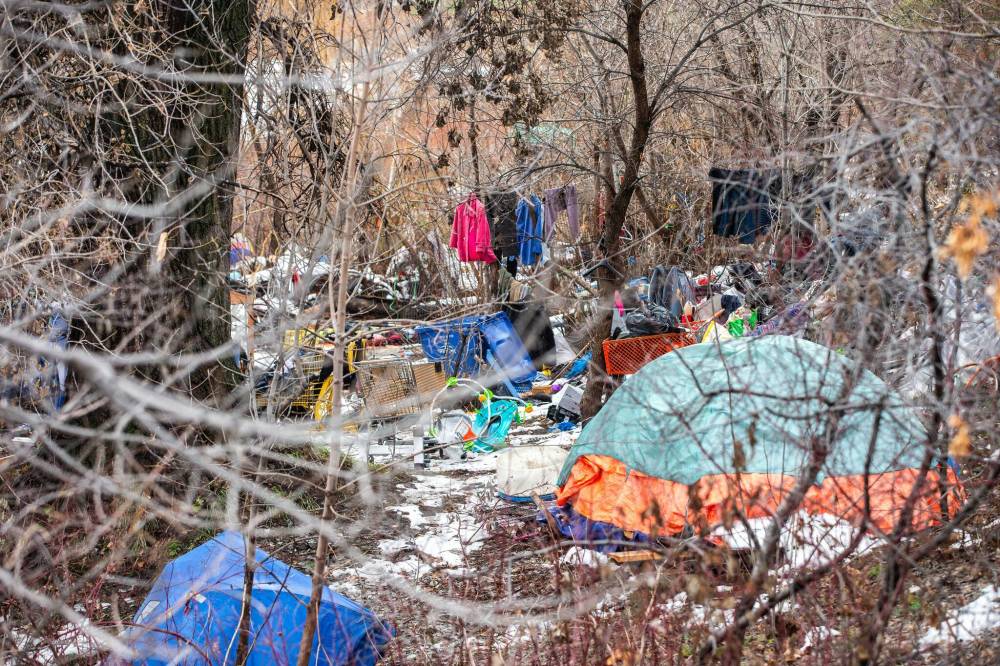Encampments need frequent safety checks
Advertisement
Read this article for free:
or
Already have an account? Log in here »
To continue reading, please subscribe:
Monthly Digital Subscription
$1 per week for 24 weeks*
- Enjoy unlimited reading on winnipegfreepress.com
- Read the E-Edition, our digital replica newspaper
- Access News Break, our award-winning app
- Play interactive puzzles
*Billed as $4.00 plus GST every four weeks. After 24 weeks, price increases to the regular rate of $19.00 plus GST every four weeks. Offer available to new and qualified returning subscribers only. Cancel any time.
Monthly Digital Subscription
$4.75/week*
- Enjoy unlimited reading on winnipegfreepress.com
- Read the E-Edition, our digital replica newspaper
- Access News Break, our award-winning app
- Play interactive puzzles
*Billed as $19 plus GST every four weeks. Cancel any time.
To continue reading, please subscribe:
Add Free Press access to your Brandon Sun subscription for only an additional
$1 for the first 4 weeks*
*Your next subscription payment will increase by $1.00 and you will be charged $16.99 plus GST for four weeks. After four weeks, your payment will increase to $23.99 plus GST every four weeks.
Read unlimited articles for free today:
or
Already have an account? Log in here »
Hey there, time traveller!
This article was published 17/11/2023 (706 days ago), so information in it may no longer be current.
Call it a case of one step forward, two steps back.
As Manitobans look down the barrel of another winter, the Winnipeg Fire Paramedic Service announced in early November it will be changing its strategy for managing fire risks at homeless encampments. Some of those changes are right on the money, some of them not so much.
Prior to the course change, the WFPS had a dedicated officer to investigate reports of fire risks at encampments, with other officers filling in as needed.

MIKAELA MACKENZIE / WINNIPEG FREE PRESS FILES
An encampment at Fort Douglas Park on Nov. 8.
That role will be dissolved, with that officer returning to other duties. Instead, a WFPS officer will attend the sites in the company of police or representatives from third-party agencies, such as Main Street Project.
That’s a step in the right direction. It’s fair the WFPS would like a police escort — the strategic rework is happening in no small part because of safety concerns, as WFPS staff have been subjected to dangerous situations involving erratic behaviour from people residing at the encampments.
It’s wise, in terms of social policy, to also involve groups who have the unique skill sets needed to successfully work with the marginalized, unhoused community.
But those improvements come at the cost of frequency and connection. WFPS Chief Christian Schmidt told the Free Press that going forward, the WFPS would only attend the sites to check up on risks on “very rare” occasions, which means a longer wait for a response on a complaint deemed less urgent. That means there’s more time for a bad situation — mounting trash, let’s say, or dangerous heating methods — to get worse.
Further, the loss of a dedicated officer to investigate the sites means residents of the encampments will have little to no familiarity with the officers coming to check up on them.
Turning the job over to a rotation of staffers makes the relationship between the WFPS and people living in the encampments impersonal and institutional. It was, clearly, already a precarious situation, but the addition of more people from more agencies attending to the calls should mitigate the risk.
So why not keep one officer on call, so that better relationships with encampment residents might be built?
It’s a puzzling bundle of changes.
On one hand, a holistic approach to checkups which both accounts for risks to WFPS staff and the need for the influence of support organizations who can help with outreach. A good move.
But at the same time, just as winter is upon us, the WFPS has decided that now is the time to check in less frequently.
As the weather gets colder, encampments are likely to get bigger, as unhoused Winnipeggers seek the (relative) warmth of these assembled communities. If the camps get bigger, the trash produced by them, and the fires started as everyone tries to keep warm, will only increase. Now is not the time to stop coming around to check up on things.
It is no easy task, to be sure. The encampments encompass myriad social ills in one place — poverty, unaddressed mental health issues, drug addiction. Trash piles up. There can be violence.
But for all that they might offend the sensibilities of Manitobans with roofs over their heads, residents of those camps are still in fact Manitobans, and they should be looked out for like any other citizen.
With the cold season coming, they’re going to need more help, and more connection to the rest of us. Not less.





